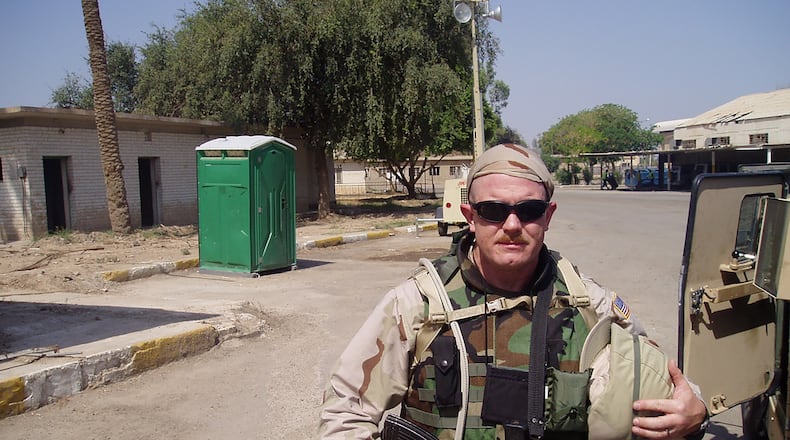Semsel grew up in Athens where his father worked as a professor at Ohio University. Semsel graduated from OU in 1988 with a major in medical technology but decided to go through the military ROTC program and join the Air Force.
“I had more than a dozen assignments,” Semsel said. “I had some overseas deployments to Iceland and Panama.”
Semsel met his wife, Ki, at OU and the couple had two daughters, both of whom grew accustomed to the military lifestyle of moving every few years.
“My youngest daughter Olivia lived in eight states before she started her freshman year in high school,” Semsel said.
But his military career not only gave Semsel an opportunity to see the world, but it also helped him develop a unique skillset and strength to overcome hardship.
“After I retired from the Air Force, I decided to work in a job supporting our veterans,” Semsel said. “Eventually I got a job with Goodwill Easter Seals locally and directed their veteran’s program and in 2020, I moved to a job with Montgomery County Veteran’s Services.”
Semsel works to help companies understand the “military mindset,” so they can be more successful at attracting and hiring veterans for their work force. But a personal health story that could have ended his career, ended up changing his life for the better.
“I was diagnosed with thyroid cancer in 2001,” Semsel said. “I had a full thyroidectomy, followed by radiation treatment.”
In 2002, Semsel had another major surgery to remove cancerous lymph nodes and in 2005, he had a third round of radiation. And in 2014, his doctors told him never to expect full remission.
“There is always potential for my cancer to return in the future,” Semsel said.
After his surgery to remove his lymph nodes from his neck in 2002 while he was stationed in Hawaii, his operations officer at the time convinced him to run the Honolulu Marathon with him. Semsel agreed though he had stopped regularly running years before.
“When I came out of surgery, I couldn’t move my arms up to my shoulder,” Semsel said. “The whole concept of a marathon was beyond me since I had never run more than eight miles.”
Semsel trained daily for eight months, and he ran that first marathon, though his operations officer was unable to join him due to an injury.
A deployment to Iraq gave Semsel some downtime with not much to do except run daily. He signed up for the Honolulu Marathon again and in 2007, he ran the Columbus marathon.
“I kept setting goals for myself and knew I could just keep getting faster,” Semsel said.
During one of his runs, he met a member of the 50 states Marathon Club and decided to set a new goal to run marathons in all 50 states. He vowed to finish all 50 before his 50th birthday.
“I ran the marathon in my last state in Eugene, Oregon in May of 2016,” Semsel said.
Today, Semsel is still supporting local veterans and is dedicated to doing what he can to stay healthy. He recently had to give up running marathons after an injury but prior to that time had successfully completed 33 “ultra” marathons – a few up to 100 miles.
“I loved the constant motion of running for 26-28 hours straight,” Semsel said. “For me running is a mental health benefit too.”
Semsel attributes his life transformation to that operations officer who urged him to run his first marathon years ago. And now that a few injuries have caused him to leave his marathon running career behind, he has started participating in triathlon races – consisting of swimming, cycling and running or walking over various distances.
“I discovered that if I got fast enough on the bike and swimming, I didn’t have to go as fast running,” Semsel said. “I have really learned to love the bike and the pool.”
And Semsel is continuing to give back to his community, coaching local runners in Kettering.
“I work with mainly middle-aged folks who are looking to learn something different,” Semsel said.
Teaching people to work with the capabilities they have and push themselves beyond what they think they can do, is Semsel’s focus. His military experience, health struggles and everything in between have taught him how much positive attitude can change a life.
“I tell everyone who I meet who has just received a cancer diagnosis how much attitude can make a difference,” Semsel said. “It has really changed my life.”
About the Author








